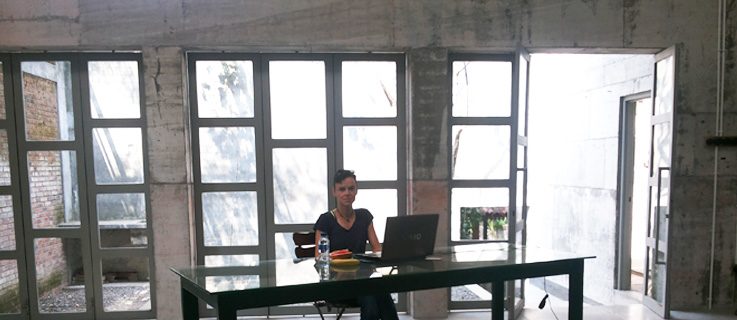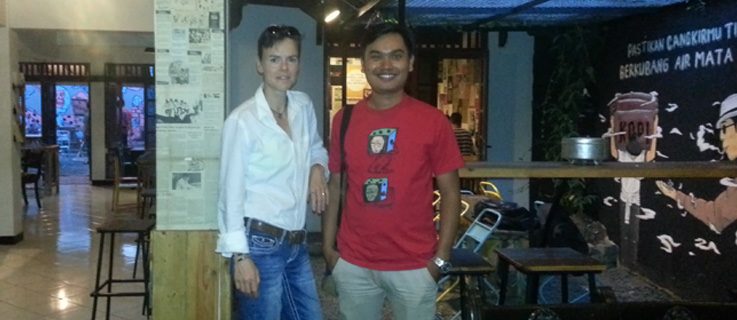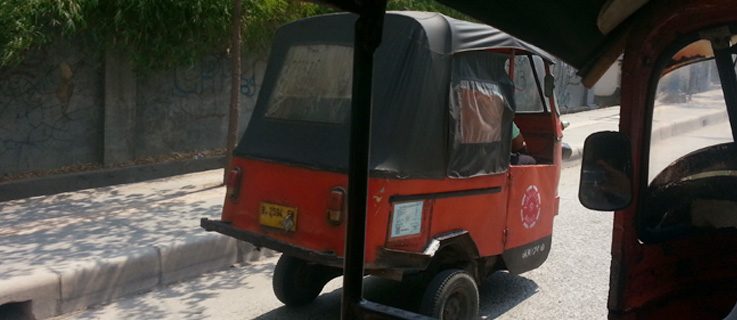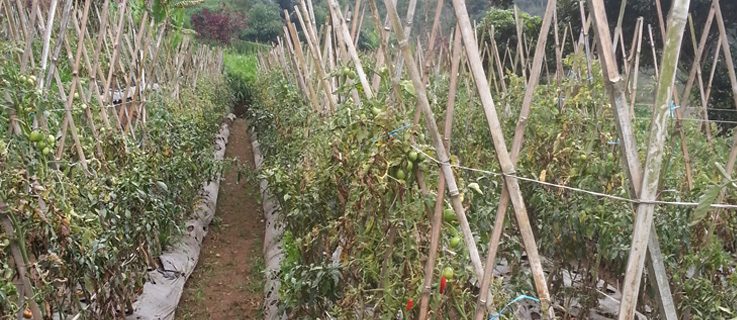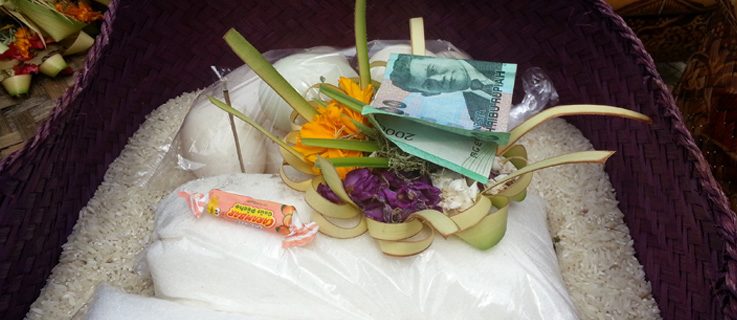Literature | Essay
..............Kokodi, kokoda
The rooster did not crow. He did not express himself as the roosters throughout the world usually do – no kikeriki or kukeliku or cock-a-doodle-doo. The animal in Jogjakarta screams. It is a penetrating screeching. Like metal being rent by a saw.
Every morning it was the same. The rooster screeched even before the muezzin. Outside it was dark, just before 4:30 a.m. A few minutes later, the surging singing from one of the many mosques began. Here it had a melodic sound. The muezzin in Jakarta was as noisy as if he were standing directly next to the hotel room bed, and he sounded like this rooster – aggressive, squawking, angry and without any sense of melody. In Jogja the rooster waited until the muezzin calmed down and the prayer began, and then he would start up again.
I got up, causing the cheeky gecko that had spent the night on the wall above my head to run behind a picture, went to the bathroom and turned on the light, a spotlight at the foot of a tree. The light illuminated the tree trunk reaching through the open roof of the bathroom to the sky. The studio belonged to a gallery, a two-story building of washed concrete, glass, open view axes and a lush green garden erected by a Malaysian architect. Balmy morning air entered from outside. It smelled sweet. Like rice cakes. Clove cigarettes. Like baked bananas, petrol and burned plastic. But no plastic burned here. Jogja seemed to be the most environmentally-conscious city in Indonesia. I had met visual artists who are actively against the rapidly increasing destruction of the rain forests of Kalimantan through afforestation with palm oil trees, monocultures that are a result of the trend toward biofuel. In Bandung a pall of haze from burning garbage had encircled the mountains. Boys squatted in the thick white smoke on the wayside and used sticks to push plastic bottles around in the glowing embers as if they were sitting at a camp fire. The toxic gases remained a long time in the kettle of the city.
The residents in Nitiprayan village were already awake. I had been told that some women are already cooking rice at three in the morning to prepare food for the day. My street was surrounded by other narrow streets, a bewildering network whirling with mopeds, with one-story houses, rice fields, fallow land with wild banana trees, workshops, concrete squares that had only one room and were open to the street, warungs selling nasi goreng and sotto ayam, and galleries of young artists often consisting of only one or two bamboo-roofed rooms.
I washed the ants off the toilet brush using the spray hose that hung next to the toilet bowl. The train toilettes also had these hoses when I travelled from Jakarta to Bandung and then to Jogja, three-hour and eight-hour trips which would probably have taken one and four hours respectively on modern rails. The spray hoses possibly explain why the squat toilets in the floors were often bathed in a toe-deep puddle.
The rooster screeched, paused, screeched. When dawn came, other roosters from all over joined in. They crowed like all other Swedish, Kyrgyz, German and probably also Brazilian roosters! The statements of this one rooster were therefore not specifically Indonesian. Conclusion: while in a foreign land water tastes differently and the air smells differently, you could not deduce from this one animal that Indonesian roosters crow differently. There had to be a different reason for his peculiar screech.
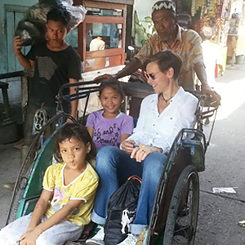 © Antje Rávic Strubel
In the outdoor kitchen – hob and fridge next to a pond with koi fish and a turtle – I made a Java coffee (brewed only in a machine) with water from the gallery’s own filter system under the sink. At the breakfast buffets in the hotels, even the expensive ones, coffee stands for hours in American glass jugs on hot plates, where it then proceeds to lose all taste. I was very disappointed with Indonesia as a coffee country; only in the Java Dancer Café in Malang did they understood how to prepare it. There I had the luxury of an old Italian espresso pot, kindly left by a German journalist who lived seventeen years in Jogja. She had relinquished such European habits a long time ago. Even when she spoke German, she used the Bahasa Indonesian sound for agreement: two low tones thrust quickly in sequence from the throat and sounding not unlike a German negation.
© Antje Rávic Strubel
In the outdoor kitchen – hob and fridge next to a pond with koi fish and a turtle – I made a Java coffee (brewed only in a machine) with water from the gallery’s own filter system under the sink. At the breakfast buffets in the hotels, even the expensive ones, coffee stands for hours in American glass jugs on hot plates, where it then proceeds to lose all taste. I was very disappointed with Indonesia as a coffee country; only in the Java Dancer Café in Malang did they understood how to prepare it. There I had the luxury of an old Italian espresso pot, kindly left by a German journalist who lived seventeen years in Jogja. She had relinquished such European habits a long time ago. Even when she spoke German, she used the Bahasa Indonesian sound for agreement: two low tones thrust quickly in sequence from the throat and sounding not unlike a German negation.
The turtle lifted its head out of the water. It stared at me darkly, swam along the edge of the pond as I went from the sink to the hotplate. The rooster cried out. I was alone. It was still half dark. A guard house was located at the heavy iron gate and occupied around the clock. But I knew that the man in the red sweatshirt – a nephew or cousin of the gallerist (everyone who worked here was related) – was not there at the moment. It was one of the several daily hours of prayer.
The rooster had to be very near. I went up a staircase and through a huge empty exhibition space open on two sides. The screeching came from so nearby that it felt like the saw was eating away through my body. I had seen many roosters running around freely in front of houses along the streets. Sometimes they ran across the road between the mopeds, which had to drive slowly because of the differently dimensioned “sleeping policemen” (speed bumps) residents built in front of their houses. Maybe the rooster had got lost in the gallery.
I was vaccinated against rabies – a recommendation in the travel and safety information of the German Foreign Office – but I had no information about what to do when one is attacked by a rooster. Fighting cocks were no rarity. The cock fight was still a popular male pastime in the villages.
It was a large animal. Bright wattles. Long decorative feathers. He was in an aviary in front of the rear entrance to the office. “Sarang” was above it. The evening before, a poet translated it for me: the name of the gallery was “Nest”. I had met the poet in a pub in Prawirotaman, the city’s night-life quarter, where there was live music every night, rock or rap, and guys in stove-pipe trousers dangling from narrow hips, their hair often shoulder length. Girls were scarce. The strict role distribution the last dictator imposed through propaganda merges well with the new trend of a strict Islam. Going out for women is spoiled because they may be branded as sluts. And in a society like Indonesia’s, in which no one is ever alone, in which solitude is bad, almost a stigma, in which everyone is understood first as part of a community, lifestyles are also subject to strict social control. Collective values go practically unexamined by individuals.
The poet fixed me in his gaze, swung back his rasta braids, proudly worn like decorative feathers, and within five minutes we were arguing. It was about good and bad communism, about Brecht, and about the book fair, and we both had too much beer. Then the music started and we stared at each other like fighting cocks. When the musicians took a break, he said he didn’t give a damn about the Frankfurt Book Fair.
“Oh?” I said.
“Whoever wants to get to know Indonesian literature should come to Indonesia,” he said.
The poet was the first person I had met in three weeks to express an opinion so directly. Up to this point I had encountered only friendly smiling people. Nobody had said anything seriously, nobody had really voiced anything other than non-committal chitchat I now realized. And certainly nothing provocative. The poet was not Javanese. He was originally from Sumatra, an ethnic Batak, known for their greater directness and aggressiveness compared to the always nice Javanese. “A little like you Germans,” someone had explained to me. Maybe he was also simply plucky. The non-committal politeness of conversations did not seem to be based solely on the famous Javanese restraint but also on decades of vigilance and fear. Indonesia celebrated its 70th independence anniversary this year. In Malang I had witnessed the militarist presentation of the official celebrations. The marches, the contingent of tanks and soldiers was a reminder that this country had been a military dictatorship called the “New Order” up to 1998.
After hunting down communists, eradication of the political left and the subsequent, often indiscriminate mass murders from 1965 to 1966, the anti-communist leader Suharto ruled with an iron hand. Even today relatives of the victims of the regime are not permitted to hold public offices. Even today it is not wise to hold communist views or, just as bad, feminist viewpoints, not to mention actually being one or the other. Feminism and communism are the same, since under Suharto the rumor was spread that women had cut off the penises of leading generals during the attempted coup. The rumor has long been revealed as army propaganda. The majority, however, still believe it. The attempted coup of 1 October 1965 has still not been fully elucidated.
What I am most surprised about is that even well-read intellectual authors who have often been abroad make statements in our discussions that are so well thought out and controlled that I was reminded of GDR television, where the censored version of the GDR was always so clearly evident. Apparently every society marked by a dictatorship, even after it has ended, needs time before people become accustomed to speaking freely. Maybe I didn’t catch the subtleties with which people expressed their true views, whose communication was so fundamentally controlled by the need for balance and harmony that instead of “no” they said “later”, instead of “I don’t know” they said “I don’t know exactly”. After all, “amok” is a word that comes from Bahasa Indonesia with Malay roots.
“Contrary to how some are now acting, this is not really the first time that Indonesian literature has dealt with 1965,” said the poet angrily. “It has played a role for a long time. Although it was dangerous to deal with this issue critically, earlier some dared to do it. And more in-depth and more comprehensively than in those shallow show novels selected for the book fair. Also, is it not strange,” said the poet, “that the man responsible for this selection belonged at that time to the anti-communist camp? A farce!”
This time I lacked the background knowledge to argue. Later I understood: the rage of the poet was directed less at the Frankfurt Book Fair and the questionable selection procedure than at a society that did not face its past. The old elites of economy, military, bureaucracy and politics are still in power, and in combination with new players and with the help of corrupt politics they continue to determine the destiny and thinking of the people. The poet is among those individuals who cannot bear it that the majority sink into the pleasant powdery mildew of collective forgetting.
His situation is, as they say, complicated. The so-called technocracy law that makes it a criminal offense to slander since 2003. Since 2003 this law has been so generously designed that it can apply to anyone making even a casual remark about a person, a value concept, a government, a religion, or even a city. A young woman who one night at a gas station couldn’t get gas for her moped tweeted to her friends out of frustration how dumb Jogja was. She was arrested, put on two months probation and had to pay a fine of 10 million rupiah. The poet was also in prison several times.
The rooster, the living icon for the name of the gallery, ran close along the wire mesh of the aviary. His comb was swollen. He ran back and forth, a claw on the concrete edge in which the meshwork was embedded. Again and again he hit the wire with his claw as if to bend it open. Due to the tightly tensioned mesh of the cage, each time he hit it it sprung back twice as hard and he would stagger.
The strangeness of his screeching was despair. This rooster still seemed to know what was beyond the aviary.
